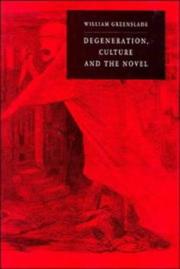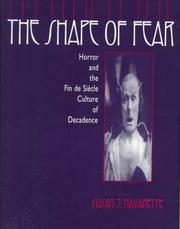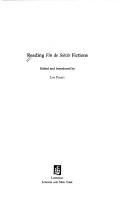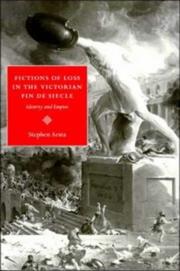| Listing 1 - 10 of 16 | << page >> |
Sort by
|
Book
ISBN: 9781040098981 1003470734 1040098983 1040098975 1032744758 9781040098974 9781003470731 Year: 2024 Publisher: Oxford : Taylor & Francis Group,
Abstract | Keywords | Export | Availability | Bookmark
 Loading...
Loading...Choose an application
- Reference Manager
- EndNote
- RefWorks (Direct export to RefWorks)
Henrik Ibsen's plays were written at a critical juncture in late nineteenth-century European culture. By reading these three plays from a fresh perspective, Ibsen and Degeneration sheds new light on some of Ibsen's most enduring contributions to world drama.
Book
ISBN: 9791036206832 9791036206856 Year: 2023 Publisher: Lyon: ENS éditions,
Abstract | Keywords | Export | Availability | Bookmark
 Loading...
Loading...Choose an application
- Reference Manager
- EndNote
- RefWorks (Direct export to RefWorks)
En Europe, la fin du XIXe siècle s'accompagne d'une hantise du déclin, qui s’est exprimée en termes de dégénérescence. Dans des textes alarmistes au contenu parfois pseudo-scientifique, certains penseurs et savants britanniques s’inquiètent de l’usure « raciale » de la nation, du péril héréditaire et de la présence insidieuse du danger dans le corps social. La connaissance de ce contexte, marqué par la renaissance du genre gothique, permet de faire sortir de l’ombre des textes inquiétants et d’apporter un éclairage nouveau sur des romans célèbres, comme L’étrange cas du Dr Jekyll et de Mr Hyde, Le portrait de Dorian Gray, L’île du Dr Moreau, Dracula et la fiction de Conan Doyle consacrée à la figure de Sherlock Holmes.L’être dégénérant en perpétuelle mutation revit un passé personnel, familial et biologique. Son corps est à la fois étranger et reconnaissable, monstrueux et déchiffrable. Certains romanciers prônent la régénération, d’autres mélangent jusqu’à les confondre la morbidité et la puissance, le dégénéré et le défenseur social, le malade et le médecin, le fou moral et le fou de moralité. En créant des êtres si indignes qu’il va devoir les liquider, l’écrivain transforme la dégénérescence en création.
Gothic fiction (Literary genre), English --- English fiction --- Great Britain --- Degeneration in literature --- Degeneration
Book
ISBN: 3825373959 9783825373955 3825361624 9783825361624 Year: 2014 Publisher: Heidelberg Universitätsverlag Winter
Abstract | Keywords | Export | Availability | Bookmark
 Loading...
Loading...Choose an application
- Reference Manager
- EndNote
- RefWorks (Direct export to RefWorks)
No scholar today would describe late antiquity as an age of "decline and fall", as Gibbon did; instead, to use Marrou's term, it is seen as an "other antiquity", which deserves to be investigated on its own terms. Yet the idea of a decadent period, accompanied by a fascination for the image of antiquity on the wane, continues to live in scholarly minds, as is suggested, after all, by the recurring insistence on the point that late antiquity was not a period of decline. This collection of papers engages in a productive way with the fascination exerted by the concept of an era in decline and a l
Classical literature --- Civilization, Greco-Roman --- Degeneration in literature --- History and criticism

ISBN: 0521416655 Year: 1994 Publisher: Cambridge New York Cambridge University Press
Abstract | Keywords | Export | Availability | Bookmark
 Loading...
Loading...Choose an application
- Reference Manager
- EndNote
- RefWorks (Direct export to RefWorks)
Degeneratie in de literatuur --- Degeneration in literature --- Dégénérescence dans la littérature --- English fiction --- -English fiction --- -Literature and society --- -Degeneration in literature --- Literature --- Literature and sociology --- Society and literature --- Sociology and literature --- Sociolinguistics --- English literature --- History and criticism --- History --- Social aspects --- Degeneration in literature. --- Literature and society --- History and criticism. --- History. --- 20th century --- 19th century --- Great Britain
Book
ISBN: 9781349496990 Year: 2015 Publisher: Basingstoke ; New York : Palgrave Macmillan,
Abstract | Keywords | Export | Availability | Bookmark
 Loading...
Loading...Choose an application
- Reference Manager
- EndNote
- RefWorks (Direct export to RefWorks)
This exciting new study looks at degeneration and deviance in nineteenth-century science and late-Victorian Gothic fiction. The questions it raises are as relevant today as they were at the nineteenth century's fin de siècle: What constitutes the norm from which a deviation has occurred? What exactly does it mean to be 'normal' or 'abnormal'?
Degeneration in literature --- Normativity (Ethics) --- Gothic fiction (Literary genre) --- Stoker, Bram, --- Stevenson, Robert Louis, --- Wilde, Oscar, --- Machen, Arthur, --- Marsh, Richard, --- Corelli, Marie,

ISBN: 0813120136 9780813120133 Year: 1998 Publisher: Lexington University Press of Kentucky
Abstract | Keywords | Export | Availability | Bookmark
 Loading...
Loading...Choose an application
- Reference Manager
- EndNote
- RefWorks (Direct export to RefWorks)
Decadence (Literary movement) --- Degeneration in literature. --- English fiction --- Fear in literature. --- Horror tales, English --- Human body in literature. --- Literature and science --- History and criticism. --- History --- History and criticism --- Degeneration in literature --- Fear in literature --- Human body in literature --- Body, Human, in literature --- Human figure in literature --- Literary movements --- Literature, Modern --- Conrad, Joseph, --- James, Henry, --- Britten, Benjamin,
Book
ISBN: 9783825361624 3825361624 Year: 2014 Volume: 140 Publisher: Heidelberg: Universitätsverlag Winter,
Abstract | Keywords | Export | Availability | Bookmark
 Loading...
Loading...Choose an application
- Reference Manager
- EndNote
- RefWorks (Direct export to RefWorks)
Classical literature --- Civilization, Greco-Roman --- Degeneration in literature --- Littérature ancienne --- Civilisation gréco-romaine --- Dégénérescence dans la littérature --- History and criticism --- Congresses. --- Congresses --- Histoire et critique --- Congrès --- Rome --- History --- Historiography --- Histoire --- Historiographie --- Littérature ancienne --- Civilisation gréco-romaine --- Dégénérescence dans la littérature --- Congrès --- Civilization, Greco-Roman - Congresses --- Degeneration in literature - Congresses --- Classical literature - History and criticism - Congresses
Book
ISBN: 9783956502477 3956502477 Year: 2017 Publisher: Würzburg : Ergon Verlag,
Abstract | Keywords | Export | Availability | Bookmark
 Loading...
Loading...Choose an application
- Reference Manager
- EndNote
- RefWorks (Direct export to RefWorks)
Antisemitism. --- Arabic literature --- Arabic literature. --- Civilization, Arab --- Civilization, Arab. --- Culture in literature --- Culture in literature. --- Degeneration in literature --- Degeneration in literature. --- Economic history. --- Enemies. --- Islam --- Islam. --- Islamic civilization --- Islamic civilization. --- History and criticism --- 1900-2099. --- Arab countries --- Arab countries. --- Economic conditions --- History

ISBN: 0582233909 0582233925 Year: 1996 Publisher: London Longman
Abstract | Keywords | Export | Availability | Bookmark
 Loading...
Loading...Choose an application
- Reference Manager
- EndNote
- RefWorks (Direct export to RefWorks)

ISBN: 0521563526 0521101271 0511553587 9780521563529 9780511553585 9780521101271 Year: 1996 Publisher: Cambridge: Cambridge university press,
Abstract | Keywords | Export | Availability | Bookmark
 Loading...
Loading...Choose an application
- Reference Manager
- EndNote
- RefWorks (Direct export to RefWorks)
It has been widely recognised that British culture in the 1880s and 1890s was marked by a sense of irretrievable decline. Fictions of Loss in the Victorian Fin de Siècle explores the ways in which that perception of loss was cast into narrative, into archetypal stories which sought to account for the culture's troubles and perhaps assuage its anxieties. Stephen Arata pays close attention to fin de siècle representation of three forms of decline - national, biological and aesthetic - and reveals how late Victorian degeneration theory was used to 'explain' such decline. By examining a wide range of writers - from Kipling to Wilde, from Symonds to Conan Doyle and Stoker - Arata shows how the nation's twin obsessions with decadence and imperialism became intertwined in the thought of the period. His account offers new insights for students and scholars of the fin de siècle.
English fiction --- Degeneration in literature. --- Literature and society --- Politics and literature --- Regression (Civilization) in literature. --- Loss (Psychology) in literature. --- Social change in literature. --- Social problems in literature. --- Culture in literature. --- History and criticism. --- History --- Culture in literature --- Degeneration in literature --- Loss (Psychology) in literature --- Regression (Civilization) in literature --- Social change in literature --- Social problems in literature --- History and criticism --- Arts and Humanities --- Literature --- English fiction - 19th century - History and criticism. --- Literature and society - Great Britain - History - 19th century. --- Politics and literature - Great Britain - History - 19th century.
| Listing 1 - 10 of 16 | << page >> |
Sort by
|

 Search
Search Feedback
Feedback About UniCat
About UniCat  Help
Help News
News